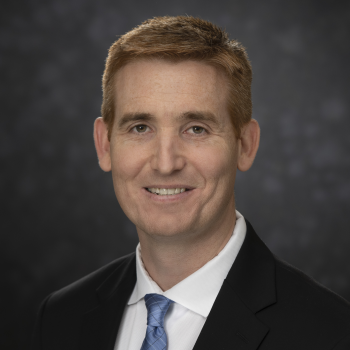Lincoln Laboratory Technical Excellence Awards
The Director's Office initiated the Technical Excellence Awards to recognize exceptional and sustained individual technical excellence that has had a significant impact on a Laboratory research area. The awardees have developed pioneering technologies and have shown great creativity in their research.
2024 Technical Excellence Award Recipients
Mark D. Padula
For his technical expertise and leadership of complex prototyping efforts, culminating in innovative laser communications and space surveillance systems for the nation, and for his dedication to ensuring the Laboratory's long-standing prototyping success.
Dr. Jason R. Thornton
For his leadership and innovation in information fusion, image and video analytics, and AI techniques for video exploitation, transforming critical infrastructure protection and physical site security for the nation.
Past Recipients
2023
Dr. Scott D. Coutts, for his creativity and leadership in developing and demonstrating novel signal processing capabilities and radar architectures and techniques, culminating in his rise to prominence in the field of high-frequency over-the-horizon radar (OTHR). Scott's expertise in OTHR is sought out by both Department of Defense programs and by allied governments and industry
Dr. Todd G. Ulmer, for his rich knowledge of free-space laser communications (lasercom), his contributions to lasercom standards, and his commitment to transferring lasercom technology to industry in support of U.S. national defense. Ulmer has driven lasercom progress forward through four generations of systems at the Laboratory, consistently demonstrating a deep technical understanding of both lasercom theory and the state of the art of key components.
2022
Dr. Joseph P. Campbell, for outstanding contributions and leadership in human-language technology, pioneering developments in speech processing, expertise in biometrics, innovations in machine learning, and effective technology transition to government. Campbell’s efforts have significantly impacted the nation’s intelligence, warfighting, and law-enforcement capabilities.
Dr. Brian A. Telfer, for sustained, outstanding achievements and leadership in developing radar and biosignal processing and machine learning technologies. His research and development efforts are counted among the Laboratory’s top contributions in multiple mission areas, ranging from missile defense to human health and performance.
2021
Dr. Sumanth Kaushik, for his broad physics and engineering expertise and his leadership ability, enabling development of advanced concepts for diverse technological innovations, including long-range laser radars for measuring micro-Doppler, novel active and passive electro-optical sensors, and techniques for phasing large optical telescope arrays
Dr. Livia M. Racz, for her deep expertise in materials science, engineering, and integration to enable technical innovations in microelectronics, sensing, and communications, for advances in active smart fibers, and for her leadership in developing microsystem solutions for challenging mission requirements.
2020
David R. Crompton, for excellence in building complex hardware systems that are critical to the development of space systems, optical payloads, and precision mechanisms, and for expertise in structural analysis and testing that enable innovative engineering solutions for ground, sea, air, and space prototype systems.
Dr. Alan J. Fenn, for innovation in developing antennas and adaptive arrays that provide revolutionary capabilities for ground-, air- and space-based radar, electronic warfare, communications, and sensing systems, and for leadership in building a world-class facility for simulating, prototyping, and testing novel antenna and electromagnetic systems at Lincoln Laboratory.
2019: Dr. William J. Blackwell and David Goldfein
2018: Dr. James K. Kuchar and Michele A. Schuman
2017: Dr. Gregory D. Berthiaume and Dr. Jeffrey S. Herd
2016: Dr. Douglas A. Reynolds and Dr. Daniel J. Ripin
2015: Dr. Daniel A. O'Connor and Joseph J. Scozzafava
2014: Dr. David O. Caplan and Dr. Vyshnavi Suntharalingam
2013: Dr. Jeremy Kepner and Dr. Roderick R. Kunz
2012: Dr. Helen H. Kim and Dr. Clifford J. Weinstein
2011: Dr. Richard P. Lippmann and Dr. Gary F. Hatke
2010: Dr. David J. Ebel and Dr. William D. Ross
2009: Dr. Tso Yee Fan and Dr. David R. McElroy
2008: Allen D. Pillsbury and Dr. Benny J. Sheeks
2007: Dr. Don M. Boroson and Dr. Bernadette Johnson
2006: Dr. Robert G. Atkins and Lawrence M. Candell
2005: Dr. John J. Zayhowski and Dr. William S. Song
2004: Dr. Stephen D. Weiner and Dr. Marilyn M. Wolfson
2003: Robert A. Bond and Dr. Richard M. Heinrichs
2002: James E. Evans and Stephen B. Rejto
2001: Dr. Barry E. Burke and Dr. James Ward

